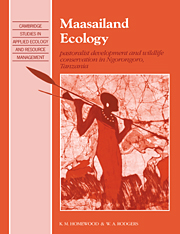Book contents
- Frontmatter
- Contents
- Preface
- 1 Management problems and applied ecology in Ngorongoro Conservation Area
- 2 Ngorongoro Conservation Area
- 3 Maasai of Ngorongoro
- 4 History, politics and perceptions in Ngorongoro
- 5 Management-oriented research in NCA
- 6 Range resources
- 7 Wildlife
- 8 Livestock ecology
- 9 Livestock and wildlife
- 10 Maasai ecology: development, demography and subsistence
- 11 Wildlife conservation and pastoralist development
- 12 Development interventions
- 13 Viewpoint
- References
- Author index
- Subject index
- Map: Ngorongoro Conservation Area, showing the main features and place names used in the text
5 - Management-oriented research in NCA
Published online by Cambridge University Press: 08 February 2010
- Frontmatter
- Contents
- Preface
- 1 Management problems and applied ecology in Ngorongoro Conservation Area
- 2 Ngorongoro Conservation Area
- 3 Maasai of Ngorongoro
- 4 History, politics and perceptions in Ngorongoro
- 5 Management-oriented research in NCA
- 6 Range resources
- 7 Wildlife
- 8 Livestock ecology
- 9 Livestock and wildlife
- 10 Maasai ecology: development, demography and subsistence
- 11 Wildlife conservation and pastoralist development
- 12 Development interventions
- 13 Viewpoint
- References
- Author index
- Subject index
- Map: Ngorongoro Conservation Area, showing the main features and place names used in the text
Summary
Menyanyukie esajati oloilelee katukul Even the shank of the cow is worth something
(You can always build on what you have – Maasai proverb: Waller 1979)Over the years a great deal of research effort has gone into investigating the ecology of the Serengeti/Ngoronogoro area. Much of this effort has been directed towards natural history and single-species ecology. Little has been of immediate management relevance and only recently have studies addressed community and system ecology. Our aim was to add selectively to the material already available to make it applicable to management problems. This chapter looks firstly at the central issues behind our study. The background of scientific knowledge which was used as the springboard for the 1982 management plan is reviewed. The chapter than outlines the way in which our own study objectives and sites were chosen, and research on range, livestock and human ecology planned, to complement and make relevant the earlier material. Since our study the Ngorongoro Ecological Monitoring Programme has been revitalised with funding and direction from World Conservation International. The Ngorongoro Conservation and Development Project (NCDP), a joint venture between NCAA, IUCN and the Tanzanian Ministry of Lands, Natural Resources and Tourism, has coordinated a series of consultancies leading up to a new management plan for NCA. We draw on these sources throughout the book.
- Type
- Chapter
- Information
- Maasailand EcologyPastoralist Development and Wildlife Conservation in Ngorongoro, Tanzania, pp. 84 - 95Publisher: Cambridge University PressPrint publication year: 1991



